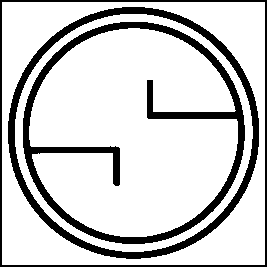And Fall
Of Synanon
Rod Janzen
(Johns Hopkins)

It pulled from AA (and the earlier "Oxford Group") techniques of co-counseling, with the gifted amateur --- those who had been there before --- showing others how to kick the habit. Those who came to experience Synanon and praise it were legion: jazz musician Art Pepper, psychologist Abraham Maslow, inventor Buckminster Fuller, actor Steve Allen, guru Tim Leary, Governor Jerry Brown, activist Caesar Chavez.
Dederich was fat, and not very pretty, but he was smart, good with his words, wily, and playful. His history was the history of a poorly educated drunk who single-handedly created a new non-bull- The unlikely influence of Hayakawa was key, for Language and Thought was a classic of its time, showed how we used language not only to express ourselves, but to hide ourselves. And in The Game --- and the multitudes of Games that the rest of us set up in imitation of Dederich's Big One --- words were the key: what we said with words, what we hid with them, how we used them to fool others. Thousands of us started our own Games all over the country: artists, hippies, teachers, professionals, peaceniks, people who were disgusted with the lies of Modern America. We would get together --- six or eight or ten of us on a Saturday night, and, instead of smoking dope or getting drunk, we would start right in, attacking each other mercilessly, exposing fears and hates and prejudices. There were only two rules: no physical violence, and no running out the door. I well remember my first one. One of my friends invited me over to his house. "I think you are going to be interested," he said. "It's just a few of us, being perfectly honest with each other." I was intrigued. It started in the early evening. No one was privileged --- there were no "trained" specialists. It was freedom of speech in personal discourse. If we suspected a lie, we said so. Small talk and commonplaces were laughed out of existence. Playacting was encouraged. Sometimes a couple of the members of the group would gang up (accusations, irony, shouting) on someone. There would be outbursts, confessions; at times, tears; at others, uncontrollable laughter. Then suddenly one of the perpetuators would become "it" --- and all would jump on him or her. There were brutal revelations (it's amazing how much we know people just by observing them, hearing them speak), many of which were triggered by statements like: "I think you are lying." Or: "How can you say such shit and expect anyone to believe you?" Or: "When you say that, I keep hearing a sad little child speaking." The world of that room with its players was charged; each moment could create an explosion. And when we finally broke up (at four or so in the morning), it was as if we had been taking some super- No wonder Dederich was so successful: he had taken psychotherapy out of the hands of the icy professionals, and by using their best techniques, empowered thousands of others. We were free to plunge into the hearts of others, to see the lies, to expose them noisily --- and come out feeling love. It was a win-win: we could pride ourselves on being searingly honest, and emerge a better (or at least a more truthful, insightful) person in the process. Those who dissented were cold-shouldered, asked to leave. Newspapers and magazines that published critical articles --- as well as individual reporters who wrote them --- were sued. Those outside Synanon who made too much trouble were roughed up. A lawyer by the name of Paul Morantz, who represented parents who wanted their children "deprogrammed," was presented with a rattlesnake in his mailbox. (He was severely bitten, and, according to Janzen, it took eighteen vials of antivenin to save his life.) In contrast to the previous fifteen years, Dederich and some of his closest associates began to give themselves hefty salaries. But the most controversial change --- outside of trying to nail dissenters --- was the decision to allow weapons. Dederich had built much of his support on the non-violent nature of Synanon. Reverence for Gandhi, Martin Luther King, and Cesar Chavez came from their pacifist stance, and Dederich fed off this, especially since he was dealing with tough ex-cons. Over the next ten years, all fell apart. Federal agents began to examine the books; state agencies looked into the treatment of children; newspapers --- fed on the Jim Jones horror --- turned hostile; Dederich himself started boozing again. The final blow was the loss of tax-exempt status in 1989 --- at which time Synanon was, to all intents and purposes, a goner. The author begins with a quote from V. S. Naipaul's Journey to Nowhere, In California one constantly had the feeling of being trapped, of endlessly crawling along the surface of an outsized Möbius strip. No wonder there was so much frenzy, so many promiscuous couplings of ideas...these people had nowhere to go, nothing left to do. His treatment of Dederich and his followers --- and those who finally rose up to put Synanon out of business, is just, even-handed, and bemused. One comes away with a picture of a troubled man who people saw as a savior --- and perhaps his fall came from that. He was authoritarian, but at first, his power was always tempered by The Game. Anyone was free to criticize him and his decisions...at least until the big change around 1975. As Janzen says, Alterations in the Game had a major impact on the functioning of the entire commune. Although it is true that in many ways the Game's brutal honesty upheld for a long time the highest standards of morality, when it became difficult for members to disagree with Chuck Dederich and other leaders in game formats a significant part of Synanon's system of checks and balances was lost. He made the rules and the rules worked until the world as he saw it began to close down on him. The last few years were classically tragic. He had --- to the end --- a few followers, but they were yes-men; he rambled and drank himself into stupors; his public appearances were painful. Once he appeared on television to say that Col. Oliver North was a "hero" and that if North every decided to run for president, Dederich would make sure that the entire Synanon community voted for him. Still, he could and did say wonderful things, like this, a cross between W. C. Fields and Suzuki: Childhood is convalescence from being dead for all eternity and for this reason should be gotten over as soon as possible... But, tragically, he, like so many charismatics, envenomed the very baby he had engendered. Janzen has done a fine job of pulling together the facts about the rise and fall of Synanon (in truth, the rise and fall of Dederich). In thirty-three years, Dederich had managed to pull off a revolution in treatment of addicts; changed the way people communicated; created a bustling and successful business run mostly by ex-junkies. And then, starting around the mid-seventies, shortly after his wife died, he began to murder his own baby.
Janzen has done a fine job of pulling together the facts about the rise and fall of Synanon (in truth, the rise and fall of Dederich). In thirty-three years, Dederich had managed to pull off a revolution in treatment of addicts; changed the way people communicated; created a bustling and successful business run mostly by ex-junkies. And then, starting around the mid-seventies, shortly after his wife died, he began to murder his own baby.